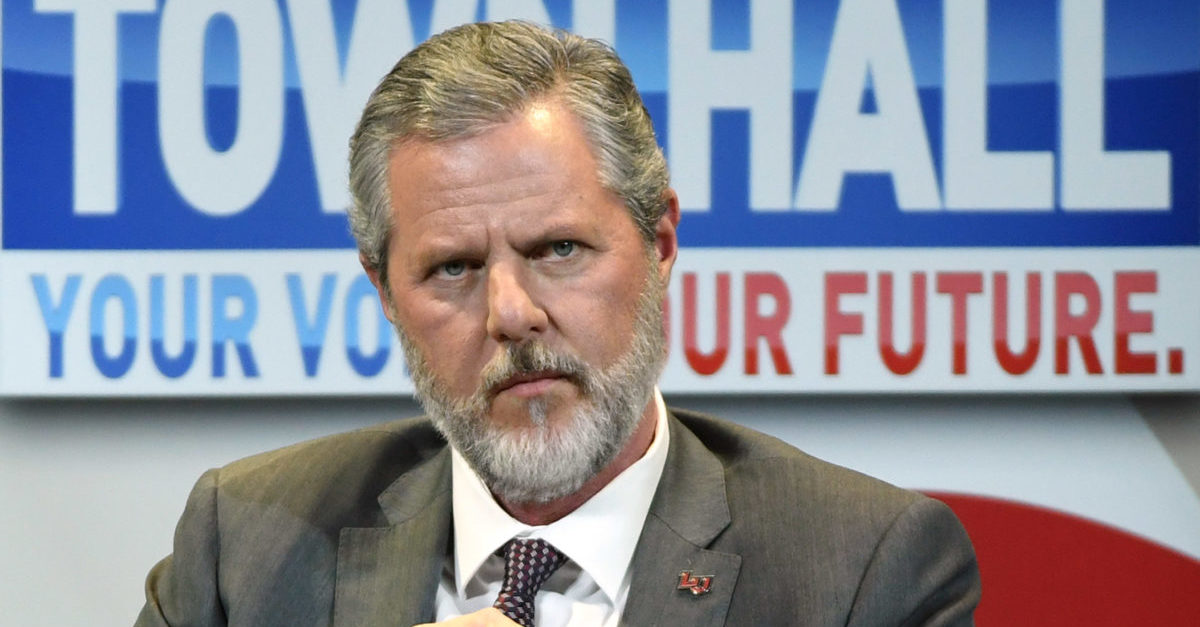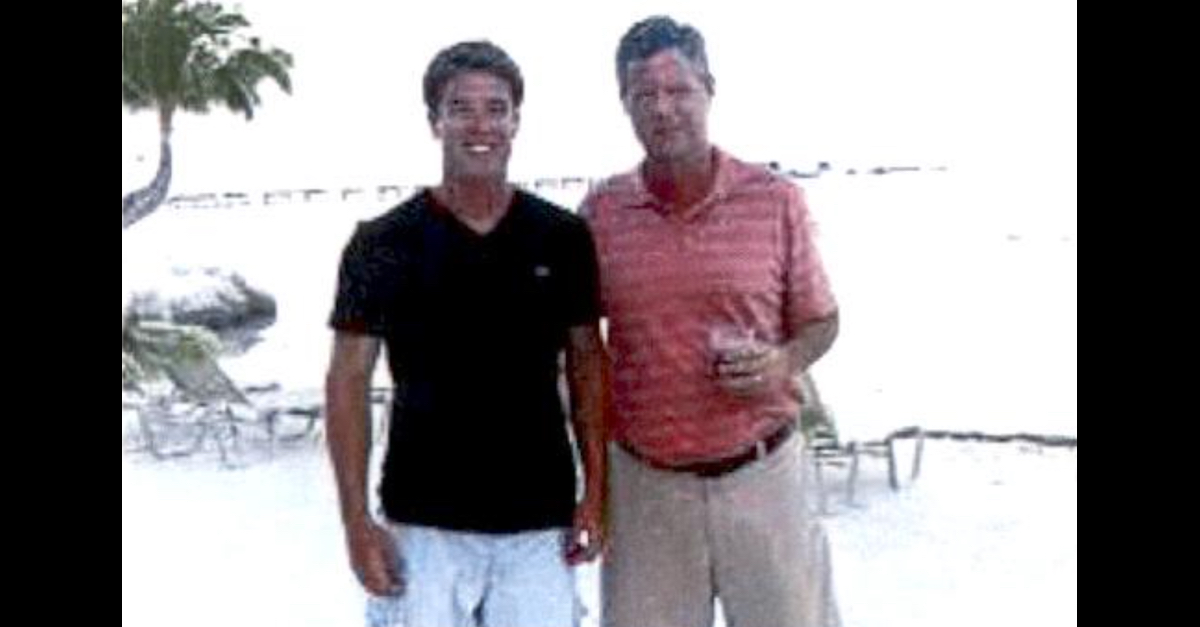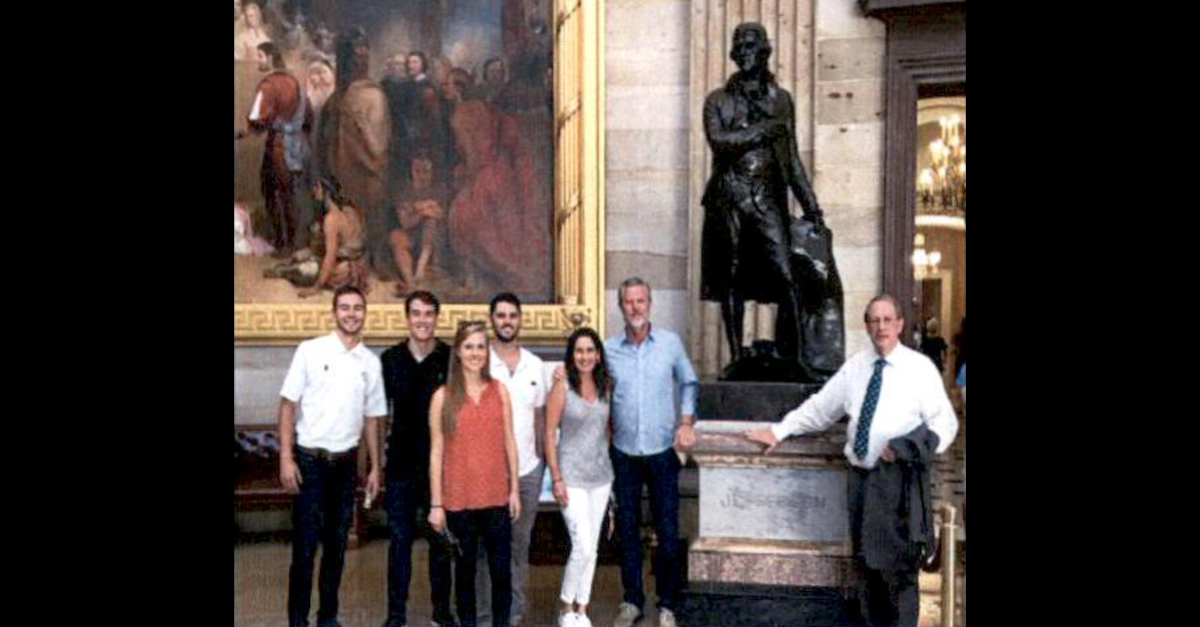
Liberty University has sued its former leader, Jerry Falwell, Jr., in Virginia state court on a myriad of claims related to Falwell’s departure last year from the institution founded by his own father. The lawsuit alleges that Falwell, Jr., enticed the University to sign him to a multi-million-dollar contact knowing full well his wife’s affair with another man and his own alcohol use would soon become public — in essence giving him an escape hatch to pocket millions despite violating the University’s moral code.
“Liberty asserts this suit for several purposes, including (a) to recover University property that remains in the possession of Falwell Jr. post-resignation, (b) to redress breaches of various fiduciary duties that Falwell Jr. owed to Liberty while serving as the University’s President and Chancellor, and (c) to recover damages for violations by Falwell Jr. of Virginia’s business conspiracy statute,” the lawsuit says.
A 74-page complaint, obtained Friday by Law&Crime, alleges three counts against Falwell, Jr. in sum total: (1) breach of contract/conversion; (2) breach of fiduciary duty; and (3) statutory conspiracy. Liberty wants Falwell to pay one $10 million damage award; another $10 million in compensatory damages “trebled as provided by statute,” $350,00 in punitive damages, other damages “provable at trial,” interest, and attorneys’ fees.
Liberty’s case in chief draws its factual assertions from two primary sources. The first is an August 23, 2020 statement Falwell, Jr. gave “exclusively” to the Washington Examiner which “divulged the saga of a ‘former family friend’ who had an affair with Becki Falwell, the wife of Falwell Jr., and ‘was threatening to expose it.'” The other is a lawsuit Falwell, Jr. himself filed against the university last year. (Falwell, Jr. “voluntarily dismissed” the case in December 2020, the new lawsuit says.)
Becki Falwell’s affair with Giancarlo Granda of Miami was well documented last summer. Liberty’s beef with the situation is that Falwell never disclosed it to the university — even when he suspected Granda of attempting to extort his family.
“Falwell Jr. and Granda both knew that matters of infidelity, immodesty, and acceptance of a loose lifestyle would stand in stark contrast to the conduct expected of leaders at Liberty,” the lawsuit alleges. “Granda had amassed considerable leverage over the Falwells, and, accordingly, they worked to keep Granda pacified and quiet.”

In an undated image embedded within the lawsuit, Donald Trump greets Giancarlo Granda as Jerry Falwell, Jr. (center) and Becki Falwell (extreme far left) look on.
Granda gained access to powerful people, the lawsuit says, and a chance to “understand how vulnerable the Falwells had made themselves by permitting his affair with Becki.”
“He [Granda] became closely exposed to Liberty’s high moral standards, which overtly clashed with Liberty’s first couple’s discordant sexual conduct,” it continues. Granda allegedly sold “intimate pictures of Becki that he had somehow acquired” to his friends. And, Falwell, Jr. claimed in his original lawsuit that “Granda’s associates” were the one who were trying to “extort the Falwells,” the new lawsuit says. But in reality, it alleges, Granda was the one really trying to shake money out of the powerful Falwells — despite the family’s attempts to “quell” the “controversy over racy photos.”
“The experience with the racy photos no doubt suggested to Granda that Falwell Jr. could be leveraged, and taught the young man that with persistence, a price might be paid by the Falwells to avoid embarrassment,” the lawsuit says. After Granda recorded calls with Becki, some of which were published by Reuters, and sought between $600,000 and $2 million to keep his mouth shut, “Falwell Jr. did not inform Liberty’s Board of Trustees of this extortive conduct.”
“The Falwells openly concede that Granda’s behavior was targeted toward damaging not only the Falwells but also ‘Liberty University,'” the lawsuit explains. “To Granda, threatening Falwell Jr.’s role at Liberty — particularly given Liberty’s religious mission and detailed behavioral codes — was the center of his plot. It was Falwell Jr.’s prominent role at Liberty that fueled the Chancellor and President’s vulnerability.”
Again, the lawsuit:
In addition to the sexual affair, Granda has repeatedly mentioned in media reports the Falwells’ fraternization in high-energy social establishments. Such behavior was prohibited for Liberty students, who, as a condition of enrollment at Liberty, would pledge to refrain from imbibing alcohol, engaging in immodest behavior, and having sex outside of a Biblical marriage. By agreement, these rules govern the students’ lives both on campus and off, and during school years and in the summer between academic years.

This image embedded within Liberty University’s lawsuit purports to show Jerry Falwell, Jr. and his wife Becki “pictured . . . amongst revelers” at a “Miami-area club.”
Falwell, Jr. is also accused of loaning $1.8 million to an “enterprise” owned by Becki Falwell, Trey Falwell (the couple’s son), and Granda, which “continued to house a liquor store” and an “on-site hostel.” (Trey Falwell was but is no longer employed by Liberty, it was revealed this week.)
The lawsuit says Falwell, Jr. called Granda “deeply disturbed,” “unstable,” “unbalanced,” “erratic,” “manipulative,” “self destructive,” “crazy,” and “verbally abusive.” He was otherwise told Granda was “racist,” “legitimately scary,” had “unresolved psychological issues,” and was given to “rages.” Yet Falwell, Jr. “worked diligently to coopt Granda into total confidentiality about the most perilous details” and worked privately to “suppress the damaging” allegations without “divulging to Liberty’s Board of Trustees[] Granda’s active attempts at extortion.”
The result was somewhat of a quid pro quo which ultimately harmed Liberty, the lawsuit alleges:
The Falwells knew they shared a unity of interest with Granda. They had an important goal in common: silence about the Falwells’ salacious acts. The Falwells needed silence from Granda in order to safeguard their personal reputation, Jerry Jr.’s professional standing, and his employment with America’s leading evangelical university.
Granda needed the Falwells to remain silent, too; Granda could not afford to let his ‘dirt’ on the Falwells leak. If the media reported the bad facts that Granda had stored up about Falwell Jr. and Becki before Falwell Jr. paid hush money to Granda, then all leverage was lost. Granda’s scheme for a pay day from Falwell Jr. would be valueless. Clearly Granda wanted to pressure Falwell Jr., but only so as to secure payment in exchange for Granda’s promise to hush the controversy.
Faced with Granda’s mounting extortive pressure, the Falwells had a decision to make: either they had to go public and expose Granda to Liberty, the authorities, and/or the media, or Falwell Jr. had to pay Granda off, and convince Granda to remain quiet forever. Despite his clear duties as an executive and officer at Liberty, Falwell Jr. chose personal protection. He committed himself to non-disclosure, and actively developed an approach to muzzle Granda.

In an image embedded in the lawsuit, Giancarlo Granda is seen with and Jerry Falwell, Jr. in the Florida Keys.
An alleged “Granda Plan” worked for six years, from 2014 to 2020, the lawsuit alleges. The Falwells “attempted to make Granda loyal to their family” with hopes he would “mature,” “accept Becki’s rejection,” and move on so “everyone involved” could “live a productive life.” The Falwells posed with photos with Granda and even took him to Washington, D.C., to meet with Rep. Bob Goodlatte (R-Va.) for a tour of the U.S. Capitol.

In an image embedded within the lawsuit, Giancarlo Granda (rear, dark shirt) is seen standing next to Jerry Falwell, Jr., and Falwell’s family atop the U.S. Capitol. At left appears to be Rep. Bob Goodlatte (R-Va.).
After “shrewdly controll[ing] Granda for nearly five years,” Falwell, Jr. suspected things would unravel. So, the lawsuit alleges, Falwell, Jr. tried to “cash in on Liberty’s prodigious success.” Among his schemes, the lawsuit suggests, was to endorse then-candidate Donald Trump for president by “work[ing] with his peer evangelicals to help make Trump’s checkered past something Christian leaders could accept and overlook.” A laundry list of Falwell, Jr.’s many public statements in support of — or excuses for — then-candidate Trump is contained within the lawsuit. But the plan “wracked” Falwell, Jr. with “constant anxiety” — and he needed “a well-resourced exit strategy,” the lawsuit says.

In an image embedded within the lawsuit, Giancarlo Granda (dark shirt) is seen with Jerry Falwell, Jr., and his family inside the U.S. Capitol.
So, “Falwell Jr. fashioned a deceitful scheme to manipulate” Liberty’s Executive Committee into giving him a new contract, worth $1.25 million a year between 2019 and the year 2030, the lawsuit says. He “arranged for” a $2.5 million severance if he “resigned for ‘Good Reason,’ or if Liberty terminated his employment without ‘Cause.'” He also “obtained” increases in retirement compensation. The financial windfall, Liberty alleges, was designed by Falwell, Jr. to result in his own financial well-being under the assumption that Granda’s accusations would become public.
Liberty suggests that it feels duped. The lawsuit says Falwell, Jr.’s new-found cash “[e]mboldened” him to finally cut Granda off. And he started hitting the bottle, the lawsuit alleges.
“To manage his stress, Falwell, Jr. began drinking significantly,” the document claims. “There were concerns that he smelled of alcohol during work interactions, but to the outside world, Falwell Jr. remained mostly within the baselines of his obligations.”
That all ended, the lawsuit reminds us, in August 2020. That’s when Falwell, Jr. posted on Instagram the now-infamous photo of himself with his pants unzipped standing next to a woman who was not his wife. The lawsuit claims Falwell, Jr. and others were engaged in a party where various people were dressed up as characters from a Canadian television “mockumentary” know as “Trailer Park Boys.” The woman in the picture with Falwell, the lawsuit says, is Kathleen Stone, the wife of Sam Stone, Falwell’s personal assistant. Both Stones were Liberty employees. Becki Falwell is said to have taken the picture against the Stones’ objections. Falwell, Jr. allegedly “promised not to show this photo to others.”
Rather, he “took to the airwaves attempting his own clean up” without trying to “engage Liberty’s public relations group to assist with the fallout.” According to the lawsuit Falwell, Jr. “called in to a local Lynchburg [Va.] radio station on August 5, 2020, and offered a slurred explanation of the unzipped pants photo, dismissing it as ‘good fun’ and drawling that he had apologized to his family and promised going forward he would be a ‘good boy.'” Some “questioned Falwell’s sobriety during the radio show.” Liberty’s board says via the lawsuit that it received no apology and no promise of good behavior.
From the court documents:
At this low juncture for Falwell Jr., his wife Becki stepped in. After the radio show incident, she contacted three members of the Liberty Executive Committee to alert them to what she described as her husband’s excessive use of alcohol. She expressed concern that drinking was adversely overtaking Falwell Jr.’s thinking and actions. She believed he needed to go away for treatment, and that it was time to take that course. Becki’s heartfelt appeal made an impact on Liberty’s leaders and helped provide a context for understanding Falwell’s questionable public comments, worrying behavior, and inappropriate social media posts.
Fallwell, Jr. asked for a sabbatical and “conceded that he had fallen short of Presidential standards.” Though he said “personal matters” had been bothering him, he told the University’s executive committee “he did not think it was necessary” to go into detail.
“This comment did not strike the Executive Committee as particularly compelling at the time, although it would become pivotal as events unfolded,” the lawsuit alleges. The University agreed to a “leave of absence” for Falwell, Jr. “during which it would pay for Falwell, Jr.’s rehab.”
But the storied leader of the institution and the institution itself ultimately disagreed with type of treatment necessary. The University alleges that Falwell, Jr. envisioned only “superficial approaches,” while Liberty “continued to insist on residential treatment.”
It was after this that a video surfaced online of Falwell working out at his trainer’s gym. “Falwell Jr. was performing pelvic thrust exercises on a weight bench with two young women, likely Liberty students, inexplicably riding either end of the barbell as Falwell, Jr. exerted himself.” The date was August 20, 2020.
On August 23, 2020, Falwell told the Washington Examiner of his history with Granda. The statement was an “attempt to pre-empt a tell-all feature that Granda himself had been preparing to publish with Reuters.” Falwell, Jr. believed he could simply resign, Liberty disagreed. For instance, “Falwell Jr.’s employment contract forbade him from publishing without the Liberty Executive Committee’s prior assent to the copy.” Falwell, Jr. wasn’t even allowed to speak about his own sabbatical. And much of what Falwell told the Examiner, the lawsuit says, was never previously revealed to the University. But by then, “Falwell, Jr. knew his new employment agreement was signed . . . [h]e also knew that he had negotiated a severance and retirement package that credited him with more base pay, twice the severance, a funded retirement plan, and a right, perhaps, to collect all of that even if Liberty fired him.”
Falwell, Jr., eventually agreed he should resign in the face of a recommendation that an Executive Committee would recommend to the full Board of Directors that Falwell, Jr. be fired — but not before “trying to negotiate for more in separation from Liberty than his contract afforded him.” He also allegedly “conferred improperly” with Liberty’s lawyers about claims he could press against the University. As a practicing lawyer, Falwell should have known that was unethical, the lawsuit says. He then bragged to the press that he would receive a $10.5 million severance — which the new lawsuit says was not as negotiated.
The lawsuit then recounts an August 31, 2020 emergency call to 911. “Falwell, Jr. was reported to present with abrasions and slurred speech . . . [f]irst responders spotted alcoholic beverage containers about the premises.” Becki Falwell “report[ed] that Falwell Jr. had locked himself in, and hand stumbled down stairs, experiencing injuries.” The lawsuit, metaphorically and literally, calls this episode the “Hard Fall.”
What follows is a recitation of the legal counts the University has made against its former leader.
The first count, breach of contract/conversion, alleges that Falwell, Jr.’s contract afforded him an almost omniscient and omnipresent ability to view the University’s confidential information — including that of students and employees. “[H]e has refused to return to Liberty or provide access codes” for information and devices which remain in his possession, the lawsuit alleges.
The second count, breach of fiduciary duty, alleges that Falwell, Jr., had a duty to disclose the Granda allegations and “extortive threats” while he was “negotiating for and entering into a 2019 Employment Agreement.” In essence, Liberty is accusing him of tricking the University of giving him a “sweetened” deal that ran afoul of the University’s tenets. It also alleges that Falwell, Jr. “failed to timely disclose and address the issue of his personal impairment by alcohol” and “procured Liberty’s outside counsel to advise him with respect to his personal causes of action, including those against Liberty, in derogation of” his duties to the University. This count alone seeks $10 million in damages.
The third count, statutory conspiracy, alleges that Falwell, Jr., his wife Becki, and Granda “acted in concert under a preconceived plan to conceal” the affair “and Granda’s extortive acts from disclosure.” The University asserts that it would not have signed Falwell, Jr.’s new employment contract if it knew what was really occurring. Again, the University seeks $10 million in damages on this count as well.
The case, which appears on the docket in the Lynchburg, Va., Circuit Court’s civil division, was filed Thursday. Attorneys Scott C. Ostdyk and Andrew F. Gann, Jr., of the Richmond, Va. law firm McGuireWoodsLLP are representing the university. Attorney R. Craig Wood, of the firm’s Charlottesville office, is also listed among the University’s counsel. Falwell does not have counsel listed in the docket as of Friday afternoon.
In a statement to The Associated Press, Falwell, Jr. said the case against him contained “lies and half truths.”
“I assure you that I will defend myself against it with conviction,” Falwell, Jr. added.
Read the lawsuit below:
[Photo by Ethan Miller/Getty Images]